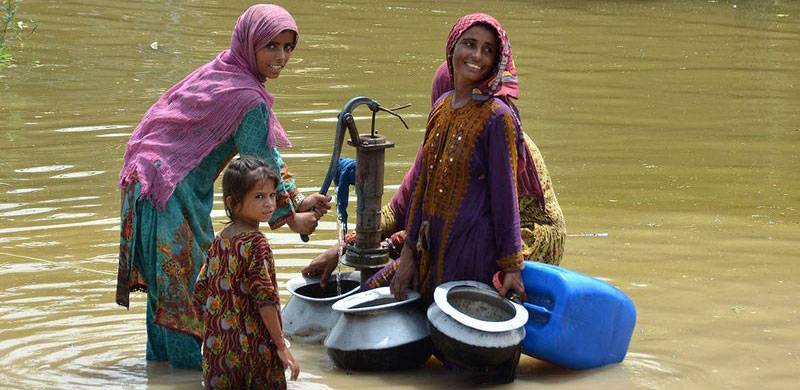
A strong believer of educating women on health and hygiene, I am literally stunned to see that we can even question whether rural Pakistani women should have access to sanitary pads -- whether in emergency or in normal situations.
The debate, particularly on Twitter on whether women in flood affected rural areas need menstrual products for personal hygiene and care, reminds me of Bollywood movie, Padman, a real-life, inspiring story of a simple, uneducated, social entrepreneur, who becomes obsessed with making low-cost sanitary napkins when he learns that his wife uses a dirty rag during her periods because of the exorbitant price of sanitary pads. He creates the machine for making affordable sanitary napkins in India, despite the massive opposition and humiliation he was subjected to.
Like any Asian woman, it embarrasses the wife who is upset because her husband is sticking his nose in ‘women’s business.’ The husband, to ensure his wife’s comfort and happiness then becomes obsessed with trying a low-cost option as he experiments with different materials.
The film, which deals with period poverty and taboo, succeeds in breaking the stigma associated with menstrual hygiene.
Discrimination against menstruating women is widespread in the subcontinent, where periods have long been a taboo and women during their cycle are considered na pak (impure). In some cultures they are even excluded from social and religious events, denied entry into religious places and shrines and even kept out of kitchens -- which justifies all the more reason to break the silence.
However, with rapid urbanisation, the rural vs urban divide is fast diminishing. Working with community women in remote areas of the country one can be pleasantly surprised that even with no schooling, women are aware and equipped with knowledge about menstruation. The use of cloth is not a choice but an affordable option.
I can recall a menstrual hygiene training, organised by one of the non-government organisations in the northern areas, where women and communities were educated on importance of proper menstrual hygiene. Some community women were given entrepreneurial trainings to produce and sell homemade sanitary pads. They were trained to prepare hygienic sanitary pads at home, using material that is easily available in the market at a low cost.
Menstrual hygiene is a touchy topic. Talking about menstrual hygiene in many areas is considered taboo, and the high cost of pads further exacerbates the situation. As a result, a majority of women prefer to use a piece of cloth that is often washed and reused over and over again which causes infections, putting girls and women’s health at risk. Many times, these infections go untreated as menstruation and gynecological issues are considered a matter of shame, therefore, no one talks about them.
The silence around menstruation has led to a lack of knowledge and choice about safe and reusable options for menstrual products for many women. I believe it’s high time we advocate for access to safe sanitary solutions for women.
The debate, particularly on Twitter on whether women in flood affected rural areas need menstrual products for personal hygiene and care, reminds me of Bollywood movie, Padman, a real-life, inspiring story of a simple, uneducated, social entrepreneur, who becomes obsessed with making low-cost sanitary napkins when he learns that his wife uses a dirty rag during her periods because of the exorbitant price of sanitary pads. He creates the machine for making affordable sanitary napkins in India, despite the massive opposition and humiliation he was subjected to.
Like any Asian woman, it embarrasses the wife who is upset because her husband is sticking his nose in ‘women’s business.’ The husband, to ensure his wife’s comfort and happiness then becomes obsessed with trying a low-cost option as he experiments with different materials.
The film, which deals with period poverty and taboo, succeeds in breaking the stigma associated with menstrual hygiene.
Discrimination against menstruating women is widespread in the subcontinent, where periods have long been a taboo and women during their cycle are considered na pak (impure). In some cultures they are even excluded from social and religious events, denied entry into religious places and shrines and even kept out of kitchens -- which justifies all the more reason to break the silence.
Working with community women in remote areas of the country one can be pleasantly surprised that even with no schooling, women are aware and equipped with knowledge about menstruation. The use of cloth is not a choice but an affordable option.
However, with rapid urbanisation, the rural vs urban divide is fast diminishing. Working with community women in remote areas of the country one can be pleasantly surprised that even with no schooling, women are aware and equipped with knowledge about menstruation. The use of cloth is not a choice but an affordable option.
I can recall a menstrual hygiene training, organised by one of the non-government organisations in the northern areas, where women and communities were educated on importance of proper menstrual hygiene. Some community women were given entrepreneurial trainings to produce and sell homemade sanitary pads. They were trained to prepare hygienic sanitary pads at home, using material that is easily available in the market at a low cost.
Menstrual hygiene is a touchy topic. Talking about menstrual hygiene in many areas is considered taboo, and the high cost of pads further exacerbates the situation. As a result, a majority of women prefer to use a piece of cloth that is often washed and reused over and over again which causes infections, putting girls and women’s health at risk. Many times, these infections go untreated as menstruation and gynecological issues are considered a matter of shame, therefore, no one talks about them.
The silence around menstruation has led to a lack of knowledge and choice about safe and reusable options for menstrual products for many women. I believe it’s high time we advocate for access to safe sanitary solutions for women.

